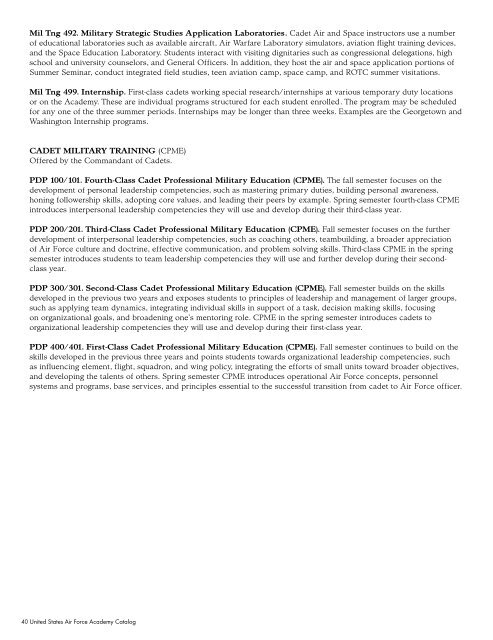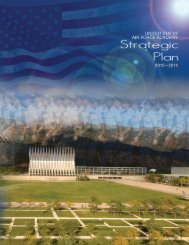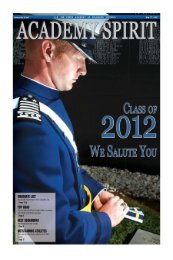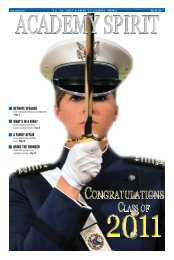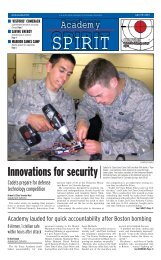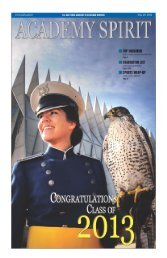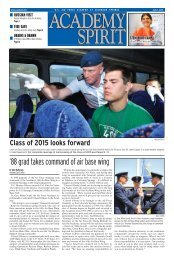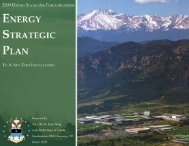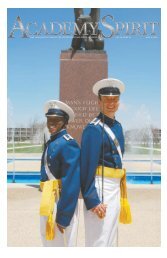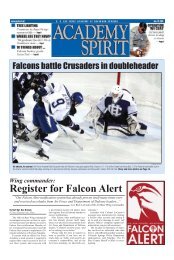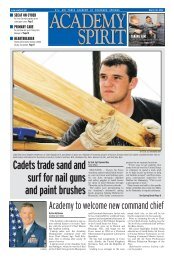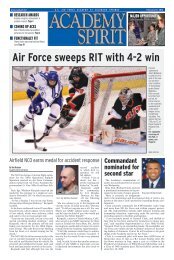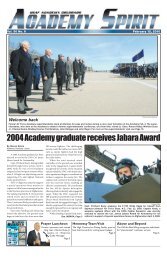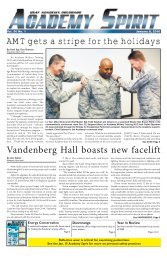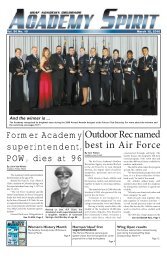2008-2009 Catalog - United States Air Force Academy
2008-2009 Catalog - United States Air Force Academy
2008-2009 Catalog - United States Air Force Academy
You also want an ePaper? Increase the reach of your titles
YUMPU automatically turns print PDFs into web optimized ePapers that Google loves.
Mil Tng 492. Military Strategic Studies Application Laboratories. Cadet <strong>Air</strong> and Space instructors use a number<br />
of educational laboratories such as available aircraft, <strong>Air</strong> Warfare Laboratory simulators, aviation flight training devices,<br />
and the Space Education Laboratory. Students interact with visiting dignitaries such as congressional delegations, high<br />
school and university counselors, and General Officers. In addition, they host the air and space application portions of<br />
Summer Seminar, conduct integrated field studies, teen aviation camp, space camp, and ROTC summer visitations.<br />
Mil Tng 499. Internship. First-class cadets working special research/internships at various temporary duty locations<br />
or on the <strong>Academy</strong>. These are individual programs structured for each student enrolled. The program may be scheduled<br />
for any one of the three summer periods. Internships may be longer than three weeks. Examples are the Georgetown and<br />
Washington Internship programs.<br />
Cadet Military Training (CPME)<br />
Offered by the Commandant of Cadets.<br />
PDP 100/101. Fourth-Class Cadet Professional Military Education (CPME). The fall semester focuses on the<br />
development of personal leadership competencies, such as mastering primary duties, building personal awareness,<br />
honing followership skills, adopting core values, and leading their peers by example. Spring semester fourth-class CPME<br />
introduces interpersonal leadership competencies they will use and develop during their third-class year.<br />
PDP 200/201. Third-Class Cadet Professional Military Education (CPME). Fall semester focuses on the further<br />
development of interpersonal leadership competencies, such as coaching others, teambuilding, a broader appreciation<br />
of <strong>Air</strong> <strong>Force</strong> culture and doctrine, effective communication, and problem solving skills. Third-class CPME in the spring<br />
semester introduces students to team leadership competencies they will use and further develop during their secondclass<br />
year.<br />
PDP 300/301. Second-Class Cadet Professional Military Education (CPME). Fall semester builds on the skills<br />
developed in the previous two years and exposes students to principles of leadership and management of larger groups,<br />
such as applying team dynamics, integrating individual skills in support of a task, decision making skills, focusing<br />
on organizational goals, and broadening one’s mentoring role. CPME in the spring semester introduces cadets to<br />
organizational leadership competencies they will use and develop during their first-class year.<br />
PDP 400/401. First-Class Cadet Professional Military Education (CPME). Fall semester continues to build on the<br />
skills developed in the previous three years and points students towards organizational leadership competencies, such<br />
as influencing element, flight, squadron, and wing policy, integrating the efforts of small units toward broader objectives,<br />
and developing the talents of others. Spring semester CPME introduces operational <strong>Air</strong> <strong>Force</strong> concepts, personnel<br />
systems and programs, base services, and principles essential to the successful transition from cadet to <strong>Air</strong> <strong>Force</strong> officer.<br />
40 <strong>United</strong> <strong>States</strong> <strong>Air</strong> <strong>Force</strong> <strong>Academy</strong> <strong>Catalog</strong>


